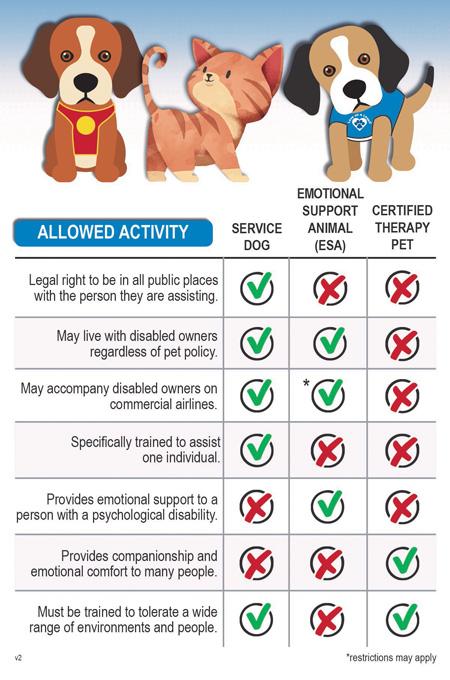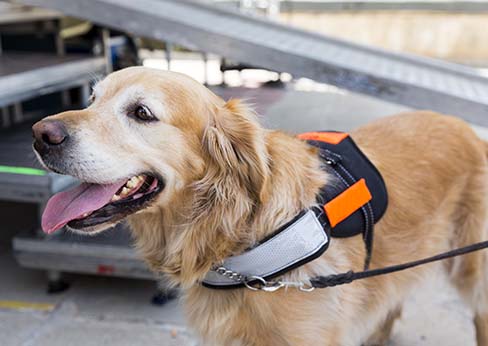Add Your Heading Text Here
In this post:
- What you need to know about service dogs
- Veterans and service dogs
- Difference between service dogs, therapy dogs, and emotional support animals
Most people cannot imagine life without their pets and many see their amazing pets as part of their families. However, many pets serve a much-needed purpose to their owners outside of companionship. As service dogs become more popular, so have the problems that can result from the lack of understanding about service animals.
What you need to know about service dogs
Video Source: American Humane
What you are allowed to ask
According to the Americans with Disabilities Act, there are two questions that business owners are allowed to ask a person with a service dog.
- Number one: is this dog required due to a disability?
- Number two: what service or task is this dog trained to do?
The work or tasks a dog has been trained to provide must be directly related to the person’s disability. Dogs whose sole function is to provide comfort or emotional support do not qualify as service animals under the ADA.
What you are NOT allowed to ask
- What is your disability? This is private and protected health information.
- Do you have proof that the dog is a licensed service dog? Service dogs do not need tags vests or any documentation.
A business owner may wonder but what if a service dog is acting inappropriately such as barking jumping on other patrons or making a mess. You can deny access to the dog due to improper behavior but you cannot deny access to the owner.
What veterans would like you to know
Veterans would like all business owners to know a few suggestions about interacting with them and their service dogs.
- Please speak to me the person and not my dog I know he or she is cute but my dog is working and needs to focus on me.
- Please do not feed my dog.
- Please do not touch or pet my dog.
- Please do not be offended if I do not want to talk about my service dog.
“Businesses should incorporate service dog training into their model for the simple reason that we would not want to turn away any guests. Someone with a cane or someone with a wheelchair we would definitely welcome them in the same with a service dog someone with a disability.” – Joni Cole Gray’s On Main Franklin TN
Importance of Service Dogs – A Veteran’s Experience
Difference between service, therapy, and emotional support

Service dogs are trained to help ONE person with physical or mental disabilities. They help with daily tasks and go through extensive training that is a specific type of disability their handler has. However, handlers can train their own service dog to perform a minimum of two tasks. Unlike some common beliefs, service dogs are not required to have a certification, license, or a vest. Service dogs are covered in the Americans with Disabilities Act.
Therapy dogs are not trained to help one person, rather these dogs bring emotional support to many people (hospitals, schools, nursing homes). Their goal is to provide love, affection, and comfort. As a general rule, therapy dogs should be trained, insured, and licensed by the non-profit that’s offering their services. They are not covered by the Americans with Disabilities Act.
Emotional support animals bring comfort, attention, and love to ONE person. They are considered companion animals and aid in easing anxiety, depression, phobias, and loneliness. They must be prescribed by a mental health professional for a patient with a diagnosed psychological or emotional disorder, such as anxiety disorder, major depression, or panic attacks. Emotional support animals are covered under the Fair Housing Act and the Air Carrier Access Act.
Special thanks to:

American Humane
American Humane is committed to ensuring the safety, welfare, and well-being of animals. For more than a hundred years American Humane has been first in promoting the welfare and safety of animals and strengthening the bond between animals and people.

Better Cities for Pets
The BETTER CITIES FOR PETS™ program helps cities be pet-friendly so more people can enjoy the benefits of a life with pets. It was created by Mars Petcare and includes a playbook for cities, an assessment tool, a city certification program, and free online resources.





